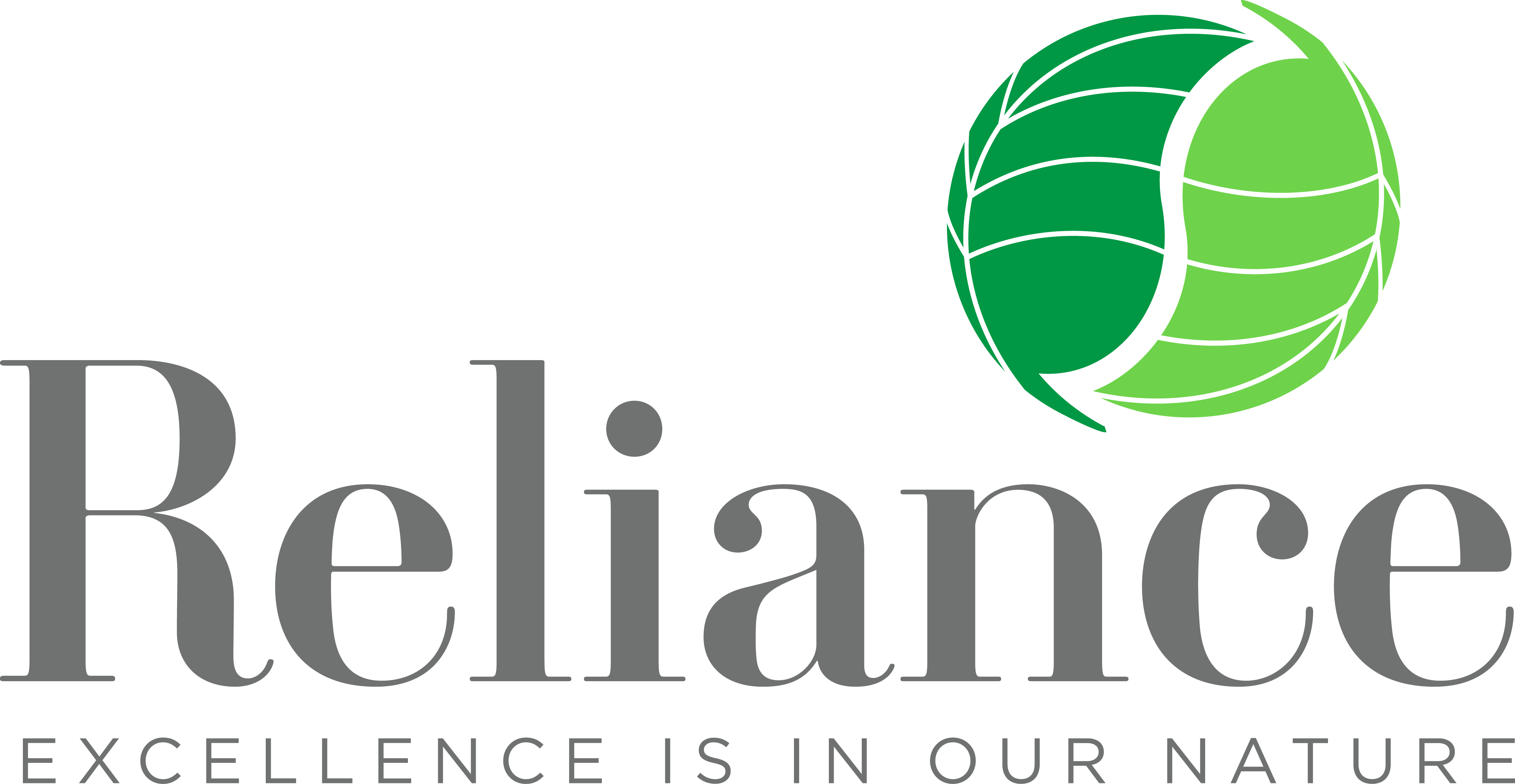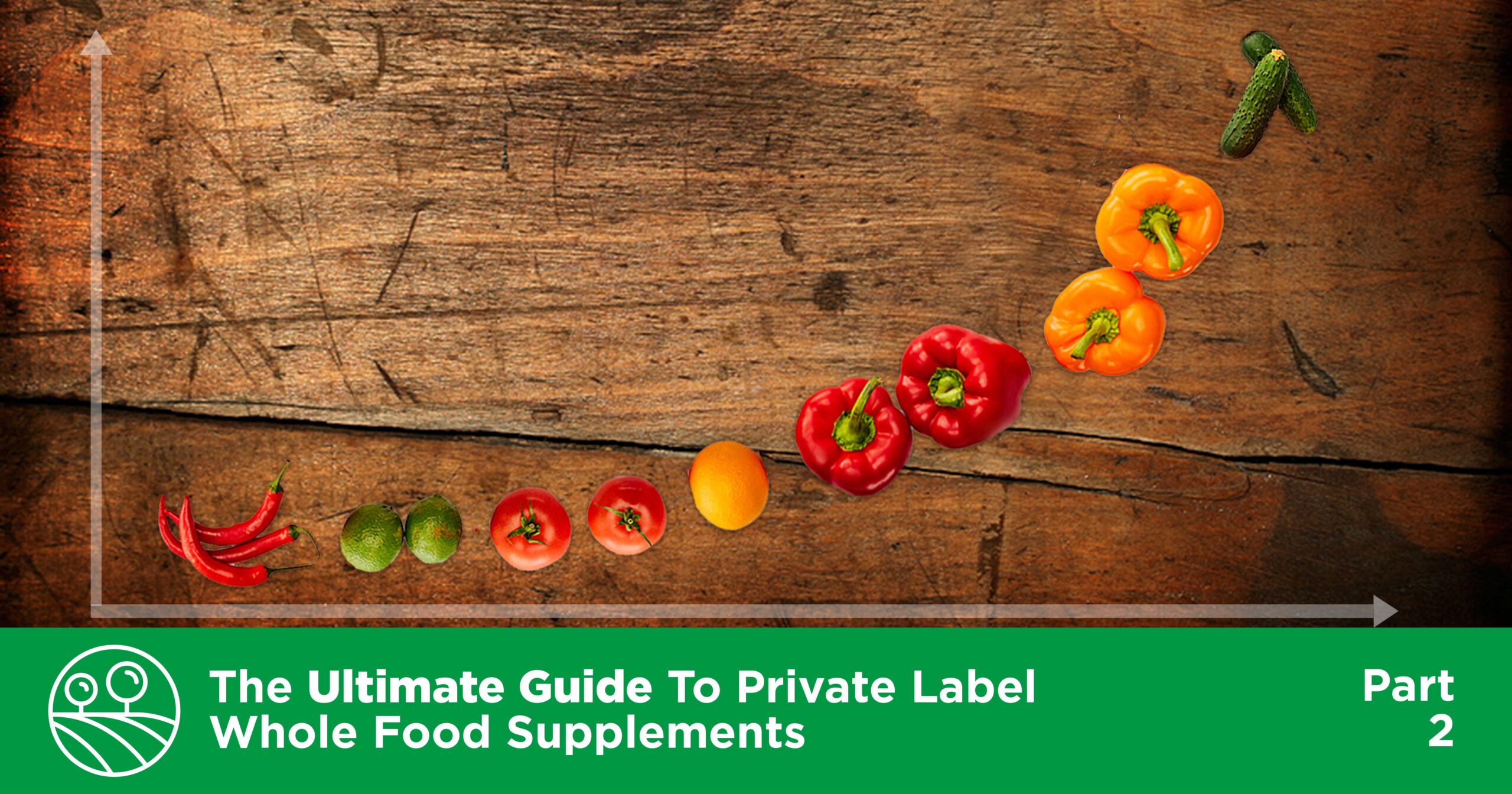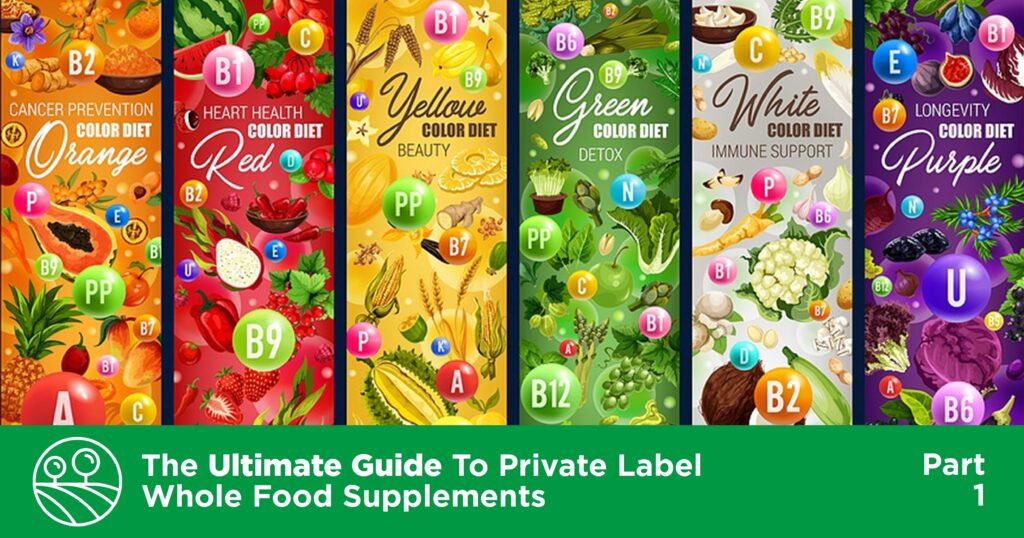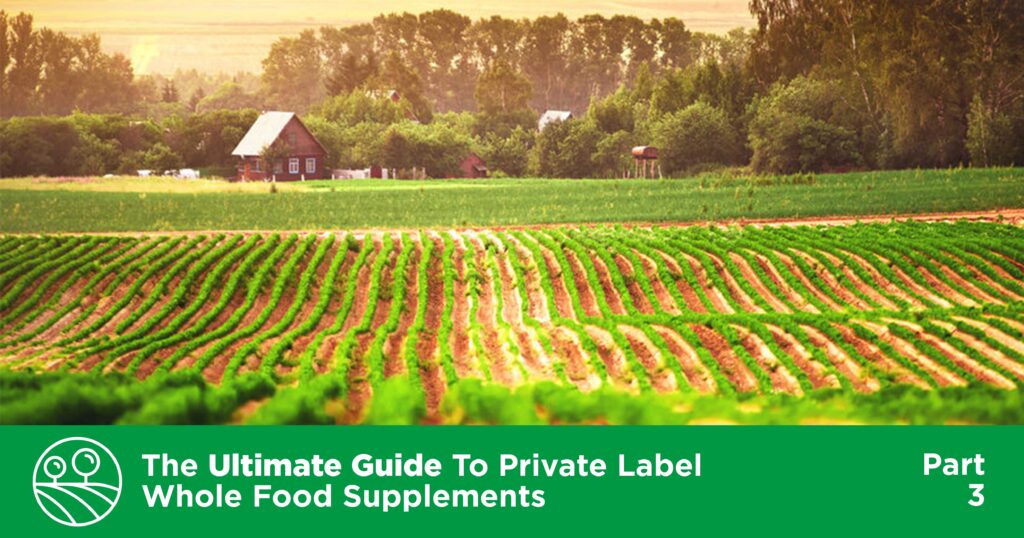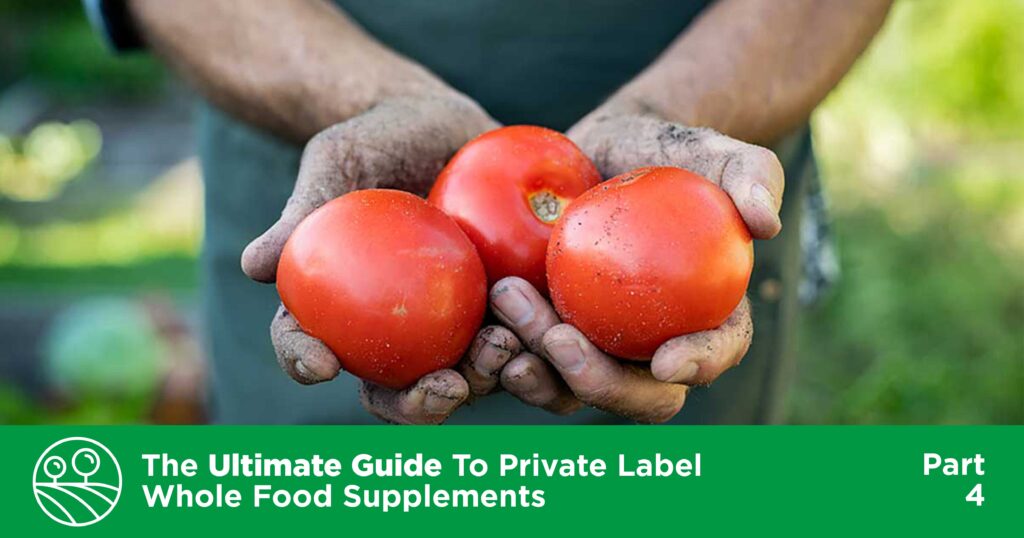This is part of our Ultimate Guide to Private Label Whole Food Supplements, a complete overview of the health benefits of Whole Food supplements, what makes them different from other types of supplements, why there is such consumer demand for them, and how they are made with transparent, high-quality manufacturing processes.
“An unprecedented demand for natural health solutions, a fundamental shift toward food and naturally functional food-based ingredients, as well as demand for cleaner, safer, and more effective products are the underlying forces set to redefine the nutraceutical market.”
Nutraceuticals World
As we covered in our previous post, whole food supplements are created from concentrated, dehydrated, sometimes fermented foods, and are intended to provide nutrients in as unadulterated and complete a form as might be obtained from eating the food sources themselves. In this second post, we will discuss who is driving the market for these products, why they are valued, and some important ways this target demographic can be reached.
Millennials Are Driving Growth for Whole Food Supplements
Apparently, the Millennial generation of today most closely identifies with Hippocrates’ much-requoted view of the true purpose of food – as medicine. Research from New Hope Network shows that millennials are more likely than the generations before them to see food as a healthful and natural way to manage their health conditions and detoxify their bodies. As a result, they’re more likely to buy food that’s grown to maximize nutrition, for example, food that’s local, organic, or grass-fed. A stroll through any local farmer’s market in the country (mask on, of course) will most likely be filled with 20 to 40-year-old customers filling their bags with private brand foods and dirty fruits and vegetables. The values and preferences of millennial shoppers align quite well with the new, more transparent dietary supplement brands on the market today.
Millennials assess the state of their health much differently than the generations before them. While baby boomers define their health based on quantitative measures like weight, BMI, and blood tests, millennials have a more holistic outlook, placing more weight on experiential measures like how their body feels, whether they have enough energy or if their digestion is on track. This holistic outlook aligns with the supplement industry, which can’t make disease claims but can make holistic and lifestyle claims that speak directly to how millennials assess their health. In fact, they take pride in how their health is managed and attribute such purchasing decisions as buying plant-based or locally made foods to responsibly caring for their own health.
According to The Brookings Institution, this generation accounts for more than $1 trillion of consumer spending power and according to the Pew Research Center, millennials are the largest living generation by population. They have a great deal of influence in the marketplace, but they feel strongly about how they spend money and they need a reason to choose one brand over another. Just being the least expensive is not compelling enough to make a purchase, which is generally a good thing in the dietary supplement industry!

Why Whole Food Supplements are a Natural Fit for Millennials
In our first post, we discussed the rise in the number of health-conscious consumers and their increasing awareness of preventative healthcare. Clean, minimally processed, natural ingredients are a trend that is popular with most of today’s health-food and dietary supplement consumers. For millennials, however, there needs to be even more for them to care about before they can be driven to a purchase:
Transparency
Millennials want to know where each ingredient was sourced from, how it was made, and what it was made with. They care about knowing where and how their supplements are produced and manufactured, and place great value on well-recognized certifications such as Certified USDA Organic and Non-GMO Project Verified.
Jeff Fromm of Millennial Marketing says in one of his “Millennial Minute” videos, “The reality is millennials don’t like secrets. They want to look behind the tent, so they’re more interested in the story behind the food, the ingredients that are on the package. Everything matters to them.” Independent, unbiased, third-party certification and verification provide millennials with this assurance and provide any private label brand with an inherent advantage.
Environmental Sustainability
The environmental impact of the ingredients within a supplement is also of high importance to millennials. The use of whole food, organic, environmentally friendly, Non-GMO ingredients are addressing the values of this consumer to consume ingredients they perceive to be both healthier and more sustainable. Their support of products that have not included the use of fertilizers, pesticides, chemicals, GMOs, and often animals demonstrates their respect for the environment and their commitment to making responsible choices about their use of energy and natural resources.
Values
In addition to checking the environmentally-conscious box, millennials like to support small brands, companies that have labor standards (such as Fair Trade), and brands that are Cruelty-Free and/or Humane – possibly altogether Vegan. Animal products and especially animal proteins have steadily been giving up shelf-space to their plant-based counterparts, contributing to a market that is expected to be worth around $5 billion before the year ends.
Health Implications
This generation is more familiar than any before them of various food allergies and sensitivities. As millennials are getting older, many have noticed that certain foods have become less tolerable for them than they used to be. One outcome and notable advantage of natural, whole food supplements is that they inherently have fewer ingredients, and the ingredients they do contain are more easily recognizable. This provides them with the assurance that the products they choose will not contribute to many of the commonly experienced symptoms of gastrointestinal distress, bloating, rashes, lack of energy, etc.
Just like all dietary supplement consumers, millennials want to know that something is working if they are going to spend money on it, and sometimes the lack of adverse effects is enough to reinforce their trust in their purchase.
How Whole Food Supplements are Being Discovered and Purchased
All dietary supplement consumers want products that are convenient and enjoyable to use, and do not take a lot of effort to locate and purchase. According to a survey by the Council for Responsible Nutrition, 80% of respondents between the ages of 18 and 34 find the dietary supplement industry trustworthy, but the way they find supplements and who they trust to influence their purchase decisions can look very different than previous generations.
In the past, the nearest Vitamin Shoppe or GNC store was the best place to comparison shop when looking for a supplement, and whichever employee was working in the store that day was basically the equivalent of today’s “influencer”. A relatively new but highly relevant resource for millennials, today’s “influencers” – people they follow on Instagram, YouTube, or Facebook whose opinions they trust – play a vital role in the process of their purchasing decisions.
Today’s supplement consumer typically knows exactly what they are looking for and will purchase online after doing some personal research. The number of products and the power of search engines make it incredibly easy to compare and review products online for price, ingredients, certifications, flavors, etc., and the availability of (mostly non-biased) reviews or the opinion of an influencer can provide an in-depth look at how a product stands up to its claims.
The Whole Food Supplement Category Will Continue to Grow
The Whole Food Supplement Category has been second in growth only to all Vitamins and Minerals post-COVID.
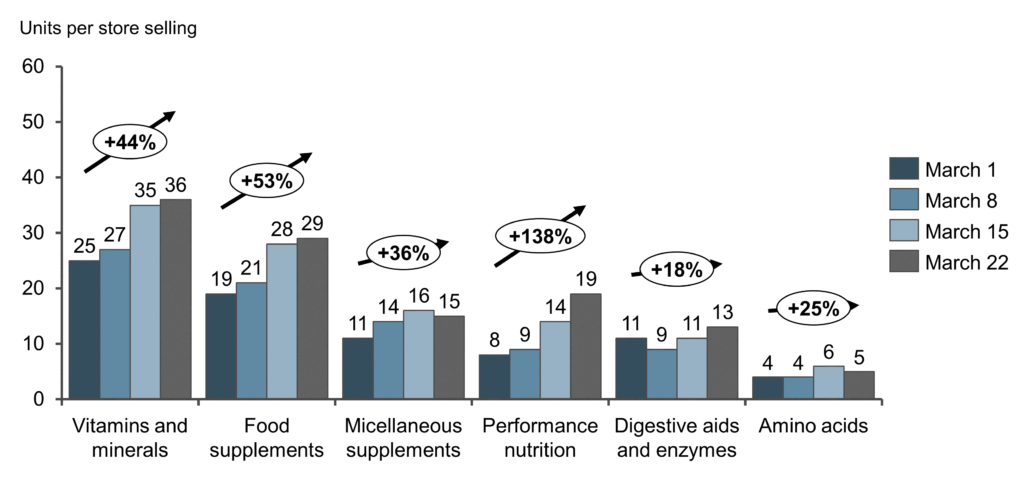
According to SPINS data, Whole Foods nutrition is at the center of growth, with big companies launching niche brands to meet the growing consumer demand for wellness, nutrition, clean ingredients, and core lifestyle values. As the dietary supplement consumers continue to push for transparency, purchasing decisions are no longer just based on which products contain animal-based ingredients, but which ones are free of major allergens, pesticides, artificial colors or flavors, and which ones are most closely representing the nutrition they would get from eating real food.
As a result, private label whole food supplements are experiencing an upswing in sales because of the value they offer. Consumers appreciate the option to purchase a product with all of the positive attributes a larger brand might carry at a lower price and tend to feel more connected to the individuality or story of a specific, smaller company. In fact, 78% of consumers want brands to use social platforms to help facilitate these connections.
By working with a private label whole foods supplement manufacturer who can provide formulas that stabilize and concentrate the naturally occurring vitamins and minerals in fruits and vegetables, the same important claims and certifications can be made on the labels that the big-brands would make, such as USDA Organic, Non-GMO Project Verified, Vegan, Excellent Source, Rich in Antioxidants, Free of Major Food Allergens, or listing the Nutritional Equivalent Number of Servings of Fruits and/or Vegetables.
Key Takeaways
- Millennials are driving growth for whole food supplements. This generation is more familiar with the “food as medicine” perspective than others have been, they are more concerned with environmental issues and they have higher requirements for product transparency and clean ingredients.
- Whole food supplements are extremely well-positioned for online shopping. Because their target demographic (millennials) prefers to shop online, this platform makes it easy for them to compare products, read reviews, and ultimately purchase online.
- The whole food supplement category will continue to grow. Increasing awareness of the benefits of whole food supplements combined with consumer demand for chemical-free, allergen-free products will continue to drive new product offerings.
- Label claims provide value. The ability to quickly look at the label of a product and gain immediate assurance that it contains clean, high-quality ingredients is of utmost importance to private label whole food supplement consumers.
➤ Learn More About What Defines a Supplement as “Whole Food”
†These statements have not been evaluated by The Food and Drug Administration. This product is not intended to diagnose, treat, cure or prevent any disease.
